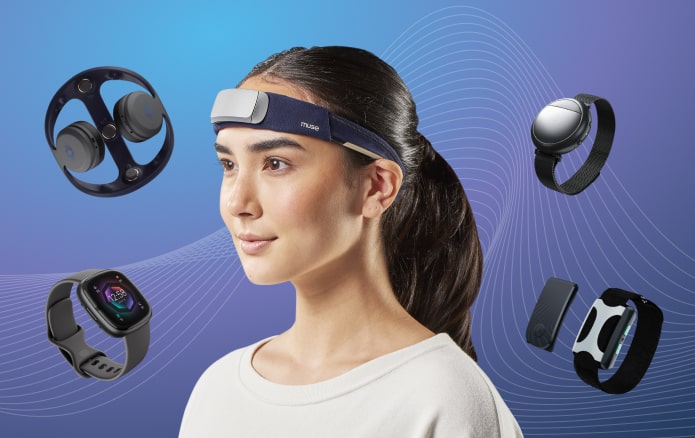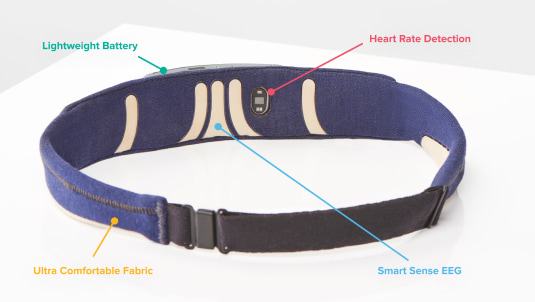Top 5 Wearables For Managing Stress In 2023

Sometimes, it feels like you just can’t get a break in life. With constant demands from work and daily life, it’s no surprise that the average person’s stress levels are through the roof!
But you're not alone. We're all in this together, looking for ways to manage our stress and not just survive, but truly thrive.
There are tons of different methods for dealing with stress out there, maybe you’ve even tried out a few! Some of the most popular methods include deep breathing, meditation, exercise and improving your sleep.
Here’s the problem. They all sound simple enough, but without the proper guidance, it’s hard to know when we’re getting the most out of each method.
Oftentimes, when we don’t have a feedback loop, we’re left wondering if each practice is really helping us improve our stress management at all.
This is where wearable technology comes into play. These are devices designed to help you to take control of your stress. They’re not just flashy gadgets, they're tools. Tools that can help you identify your stress triggers, guide you through relaxation techniques, and even improve your sleep quality.
But where do you start? There's an overwhelming list of wearables out there, each with its own set of features, advantages, and drawbacks.
How do you choose the one that's going to give you the most bang for your buck – the one that's going to make a real, positive impact on your life?
Well, you're in the right place. We've done the research for you. We've analyzed the top wearables for managing stress, looking at their features, usability, and most importantly, their effectiveness.

How Can A Wearable Help Me Manage Stress?
In the same way you might use a fitness app to improve your health, a stress management wearable can help you improve your mental well-being.
These devices monitor things like breathing, heart rate, sleeping patterns, brainwaves, and more. Each wearable uses this information to help you manage stress uniquely. Some of these methods include guided meditation, sleep optimization, direct biofeedback, and more.
More than anything, these tools can become your personal guide in better handling overwhelming situations. By offering a clearer perspective and path of action, these devices can empower you to better navigate stress.
What To Look For in a Stress Management Wearable
-
Real-time Biofeedback
By responding to your state immediately, you’re better able to deal with those stressful thoughts and feelings. This feedback also trains you to become better at managing stress around the clock, and not just when you’re using the device. Meaning you’ll be more resilient in day-to-day life, rather than reliant on the device.
- Accurate Data Tracking
Accurate measurements of stress levels, sleep quality, and other relevant metrics ensure that you can make informed decisions about your stress management strategies. It also means that you don’t have to second guess yourself, so you have real confidence in your improvements.
- Long-Term Improvement
Your wearable should make you feel like you’re gaining the ability to better manage stress in day-to-day life. With this long-term improvement, you can look back and see if the device is actually helping you live a better life, rather than just helping you feel better in the moment.
- Sleep Assistance
Great sleep leads to less day-to-day stress. For this reason, seek out wearables that include features for enhancing sleep quality. Whether it's tracking your sleep patterns, offering guidance to improve sleep hygiene, or creating a calming pre-sleep environment, these features can greatly contribute to how you feel when you wake up each morning and deal with stress throughout the day.
What to Avoid?
Devices that deliver inconsistent or inaccurate data can cause frustration and lead to misinformed decisions about your stress management. It's crucial to seek out wearables with a proven track record of reliability and accuracy. Put simply, if you can’t trust it, it can’t help you!
Avoid wearables that do not offer an effective way to track progress over time. If a device doesn't provide this feature, it's difficult to measure its long-term effectiveness. And without this information, it’s hard to know if it’s actually helping you improve your life, or even making a difference at all.
Be wary of devices that lack backing from credible studies or research. In today's market, there are tons of products that make promises without the evidence to back them up. Credibility is key. If a product doesn't have this, it could be a signal that it doesn't work as intended. Always look for devices that are supported by real and credible research by well-known organizations.
Top 5 Wearables For Managing Stress In 2023
1.) Muse

pros
- Muse helps us better understand our minds. It gives us the ability to measure, adjust, and improve our well-being. It takes out all the guesswork.
- It tracks your brainwaves, heart rate, breathing, movement, and sleep. Making it the most comprehensive tool for identifying stress patterns and improving overall wellness.
- Its rich variety of 500+ soundscapes and guided meditations make your meditation practice more engaging and enjoyable.
- The headband's fit is adjustable and comfortable, ensuring that it can be worn for extended periods without causing any discomfort.
- It has extensive sleep tracking features, including a sleep score and insights about your sleep stages and quality.
- Muse is used in studies done at Harvard, MIT, IBM, NASA, and more. Making it a credible, and reliable tool leagues above many other wearables.
cons
The Bottom Line
The Muse S Headband sets a high standard in the stress management wearables category. It uses a suite of tools including meditation, breathing exercises, and brain analytics to help you better combat feelings of stress. For this and many other reasons, It’s our top pick for tools that help you manage stress in 2023.
It allows you to track, optimize, and improve how you feel every day. Its main feature uses EEG (a fancy word for brainwave sensors) to provide real-time feedback on the user's mental activity during meditation. It’s like having an expert meditation coach in your pocket.
Along with its many other features, Muse does a wonderful job of helping you relax, calm down, and collect more moments of peace in your day-to-day life. Whether you're new to guided relaxation or an expert in meditation, the Muse S adapts to your skill level, offering you a unique experience every time.
It’s also an effective tool for managing stress long term. Many users report long-term decreases in their levels of stress, as well as improvements in their focus, calm, and overall well-being.
2.) Sens.ai
B+
OVERALL GRADEpros
- Uses sensors to measure Gamma brainwaves and help you train your brain.
- Gives you visual feedback on your mental state via its app.
- Has a wide selection of guided programs for finding calm and focus, as well as personalized challenges.
cons
The Bottom Line
The Sens.ai Headset uses real-time biofeedback to help you train your brain. It uses “personalized missions” to help you reach a more ideal mental state.
While similar to the Muse S, the Sen.ai lacks many essential features. Its biofeedback is limited to gamma brainwaves, while the Muse S measures all 5 brain states (Gamma, Beta, Alpha, Theta, and Delta). It also lacks any sleep tracking or assistance features.
Despite having fewer functions, the Sen.ai is also more expensive, starting at around $1,300. For these reasons, it sits at number 2 on our list.
3.) Apollo Neuro
B
OVERALL GRADEpros
- Aims to help reduce feelings of stress with touch therapy.
- Offers several modes tailored for different situations, including sleep, relaxation, and focus.
- The water-resistant design makes it suitable for use in various environments.
- It's versatile in its application. You can wear it on your wrist or your ankle, giving you flexibility based on your comfort and preference.
cons
The Bottom Line
The Apollo Neuro aims to help users reduce feelings of stress with touch therapy. It comes with several modes including sleep, relaxation, focus, and recovery to help users see an improvement in their stress management.
Though novel, its appeal may not resonate with everyone, as some users find its vibration sensation uncomfortable or annoying.
It’s also hard to measure long-term improvement with the device due to its lack of tracking features. For these reasons, it’s number 3 on our list.
4.) Embr Wave
B-
OVERALL GRADEpros
- Provides thermal relief with the touch of a button.
- Controls make it easy to switch between warming and cooling.
- Sleek bracelet design that can be worn throughout the day.
cons
The Bottom Line
The Embr Wave adds a new angle to the wearable technology market. This wearable claims to reduce stress by manipulating body temperature.
Unfortunately, its method of providing direct relief makes it less likely for users to build confidence in their stress management without the device.
It’s meant primarily to assist individuals who regularly experience hot flashes, by emitting cooling waves to your wrist during moments of stress, inducing a calming effect.
While interesting, for those who don't experience hot flashes, it may not be as useful in directly helping manage stress. For these reasons, it sits at number 4 on our list.
5.) Fitbit Sense
C
OVERALL GRADEpros
- Keeps track of health metrics including sleep, heart rate, and activity levels, providing a broad perspective on your health.
- Includes a small selection of guided breathing sessions and basic mindfulness exercises.
cons
The Bottom Line
The Fitbit Sense rounds out our list of the top wearables for stress management.
It includes basic tools to help identify and manage stress, like heart rate, sleep, and activity level monitoring.
Though the Fitbit Sense is widely recognized by the masses, its usefulness in direct stress management doesn’t quite stack up with many of the other wearables on this list. While it gives the user a broad view of their health, it doesn’t provide specialized focus or guidance found in other devices.
For these reasons, it’s last on our list.
